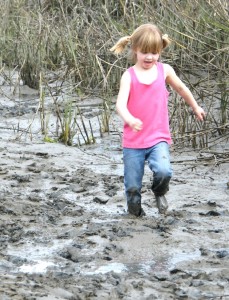I wrote, a few weeks back, about my girls’ and my kayak adventure to Sister Island (The Naturalist’s Corner Mar. 16, 2011) on a recent trip to Isle of Palms. Well the kayak trip was only the beginning of an even deeper more visceral immersion into the primordial ooze that is tidal marsh.
Low tide followed us back to the dock after our kayak adventure. The marsh grass that had swayed gently, pushed then pulled by the incoming, then ebbing tide, now jutted out of a grey-black ooze alive with fiddler crabs dancing sideways across the surface and disappearing into muddy bubbles that covered the entrance of their tunnels. If there are two things my girls can’t resist – well actually, there are a myriad of things my girls can’t resist, but two of them are skittering critters and mud.
The retreating tide had gently lowered the floating landing that holds the kayak, till it was resting on the glistening gunk. It was one short jump for kids but one giant exuberant jump for kidkind. The girls plopped, or maybe pluffed, knee deep into the muck amidst giggles and whoops of excitement.
We’re not talking about some bare earth that got rained on and is now squishy – we’re talking boot sucking, boat sticking, livestock eating mud. This mud is the mother of all mud. And it rolls into the marsh on the back of every river, bayou, creek, slough and ditch seeking to become one with the ocean. The Lowcountry locals have a name for this fecund jello – it is called “pluff mud.” And it is referenced throughout the Lowcountry from Pluff Mud Alley in Mount Pleasant to Pluff Mud Field Airport in Charleston to Pluff Mud Art Gallery in Bluffton – there is even an online Pluff Mud magazine and dinner in Charleston wouldn’t be complete without pluff mud pie for dessert.
The distinct pluff mud aroma emitted as anaerobic bacteria, at home in the dense muck, devour organic matter, releasing hydrogen sulfide mixes with the salt air and the bouquet tugs at the soul and psyche of Lowcountry natives and “marsh rats” everywhere. The etymology of pluff mud is not nearly so obvious as its attributes.
Some Internet sleuthing revealed that the term was also spelled plough mud, though pronounced “pluff” not “plow.” Pluff was the colonial English pronunciation of the word plough at the time the country was settled. Lowcountry natives apparently adopted the phonetic spelling of the English plough “pluff.” But why plough mud? I could not find a simple explanation – perhaps some reader may know. I imagine it has to do with the vast agricultural resources that the Lowcountry was noted for – the endless acres of cotton and rice produced from the fertile black earth.
I did find one colorful colouqualization for the term offered by the Myrtle Beach Convention Center’s webmaster, “Pluff’ is actually the sound you hear when your truck keys fall out of your shorts pocket, while you’re climbing over the side to drag the boat out of the aforementioned pluff mud.”
I tend to think of it as the sound made by little hands trying frantically to scoop skittering fiddler crabs from the shiny surface before they disappear.

